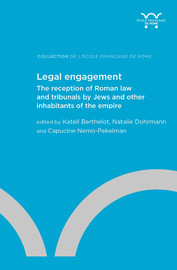Collection de l'École française de Rome
- Éditeur : Publications de l’École française de Rome
- Collection : Collection de l'École française de Rome | 579
- Lieu d’édition : Rome
- Année d’édition : 2021
- Publication sur OpenEdition Books : 30 juillet 2021
- Nombre de pages : 544 p.
The Roman empire set law at the center of its very identity. A complex and robust ideology of law and justice is evident not only in the dynamics of imperial administration, but a host of cultural arenas. Citizenship named the privilege of falling under Roman jurisdiction, legal expertise was cultural capital. A faith in the emperor’s intimate concern for justice was a key component of the voluntary connection binding Romans and provincials to the state.
Even as law was a central mechanism for control and the administration of state violence, it also exerted a magnetic effect on the peoples under its control. Adopting a range of approaches, the essays explore the impact of Roman law, both in the tribunal and in the culture. Unique to this anthology is attention to legal professionals and cultural intermediaries operating at the empire’s periphery. The studies here allow one to see how law operated among a range of populations and provincials—from Gauls and Brittons to Egyptians and Jews—exploring the ways local peoples creatively navigated, and constructed, their legal realities between Roman and local mores. They draw our attention to the space between laws and legal ideas, between ethnic, especially Jewish, life and law and the structures of Roman might; cases in which shared concepts result in diverse ends; the pageantry of the legal tribunal, the imperatives and corruptions of power differentials; and the importance of reading the gaps between depiction of law and its actual workings.
This volume is unusual in bringing Jewish, and especially rabbinic, sources and perspectives together with Roman, Greek or Christian ones. This is the result of its being part of the research program “Judaism and Rome” (ERC Grant Agreement no. 614 424), dedicated to the study of the impact of the Roman empire upon ancient Judaism.
Roman Law, provincials and barbarians
Accommodating former legal systems and Roman lawCicero’s rhetorical and legal perspective in the Verrine orations
Imperial justice as drama
A frenzy of sovereigntyPunishment in P.Aktenbuch
Between the good king and the cruel tyrantThe Acta Isidori and the perception of Roman emperors among provincial litigants
Provincial negotiation with the imperial legal system
Appealing for the emperor’s justiceProvincial petitions and imperial responses prior to Late Antiquity
Representing the rights of a cityEkdikoi in Roman courts
Legal pluralism under empire
Legal pluralism in the Western Roman EmpirePopular legal sources and legal history
Judicial pluralism in the Visigothic kingdom of ToulouseSpecial jurisdictions and communal courts
Imperialism and the creation of local lawThe case of rabbinic law
The impact of imperial law on rabbinic legal thinking
Did Palestinian rabbis know Roman law?Methodological considerations and case studies
A rabbinic postliminiumThe property of captives in tannaitic halakhah in light of Roman Law
“A proselyte whose sons converted with him”Roman laws on new citizens’ authority over their children and tannaitic rulings on converts to Judaism and their offspring
Ad similitudinem arbitrorumOn the perils of commensurability and comparison in Roman and rabbinic law
Law and self-perception
“Not like our Rock is their rock” (Deut 32:31)Rabbinic perceptions of Roman courts and jurisdiction
“Barbarians” judge the lawThe rabbis on the uncivil law of Rome
© Publications de l’École française de Rome, 2021
Conditions d’utilisation : http://www.openedition.org/6540










 Stumble It!
Stumble It!

No comments:
Post a Comment